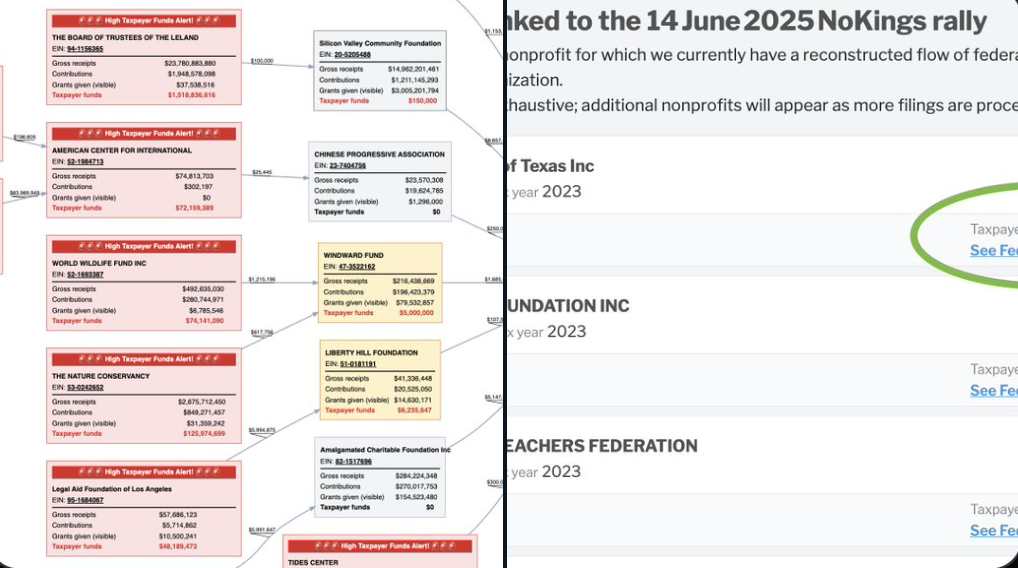A recent exposé by the social media account DataRepublican has shed light on a complex web of federal grant money allegedly supporting groups behind the upcoming “No Kings Day” protests, raising fresh concerns about transparency, political influence, and donor-advised funds (DAFs).
According to the detailed analysis, millions of dollars in government grants were funneled through DAFs—financial vehicles that allow donors to contribute to charitable causes while remaining anonymous—to organizations linked to the June 14 “No Kings Day” rally. The data points to major nonprofit intermediaries, including the American Civil Liberties Union (ACLU) and the Silicon Valley Community Foundation (SVCF), as key nodes in the funding network.
Critics say DAFs, while legal and widely used, enable “influence laundering” by allowing donors to steer money to politically active nonprofits with minimal transparency. The Internal Revenue Service has previously flagged concerns about DAFs being used for tax avoidance and obscuring the true source of politically motivated contributions.
“Donor-advised funds operate in a gray zone,” said Dr. Karen Ellis, a tax law expert at Georgetown University. “They can be used to quietly shape the political and social landscape without triggering traditional disclosure requirements.”
Historical precedent adds fuel to current concerns. A 2017 investigation into the Silicon Valley Community Foundation revealed it had distributed over $330,000 through DAFs to organizations such as the Council on American-Islamic Relations (CAIR) and Islamic Relief. Critics argue these transactions lacked sufficient public scrutiny, particularly given the politically sensitive nature of the recipients.
Now, similar channels appear to be funding organizations involved in coordinating the No Kings Day protests—an event promoted as a stand against authoritarianism and U.S. immigration enforcement policies, especially those linked to former President Donald Trump.
Supporters of the event defend the use of DAFs as a legitimate tool for supporting civil society. “DAFs provide crucial flexibility for philanthropic giving,” said an ACLU spokesperson. “They empower donors to contribute to vital causes while ensuring financial stewardship through vetted institutions.”
Yet the revelations are prompting renewed calls for oversight. Peer-reviewed studies, such as a 2018 Nonprofit Quarterlyanalysis, warned that DAFs can serve as “shadow finance” mechanisms in the nonprofit world, often operating without the transparency expected of direct political donations.
The concerns are not limited to the United States. A 2023 European Parliament report cited similar patterns of undisclosed donor influence within NGO networks, including significant funding to Open Society Foundations and affiliated advocacy groups.
As the “No Kings Day” rally approaches—coinciding with Flag Day and a controversial military demonstration planned by the Trump campaign—lawmakers and watchdog groups are urging closer scrutiny of the financial architecture underpinning modern protest movements.
“This isn’t about shutting down speech,” said Rep. Mark Dalton (R-TX). “It’s about ensuring that political activism isn’t quietly manipulated by unaccountable interests hiding behind tax shelters.”
With political tensions running high and questions swirling over the financial backbone of activism in the digital age, the debate over donor-advised funds and nonprofit transparency is likely to intensify in the days ahead.

